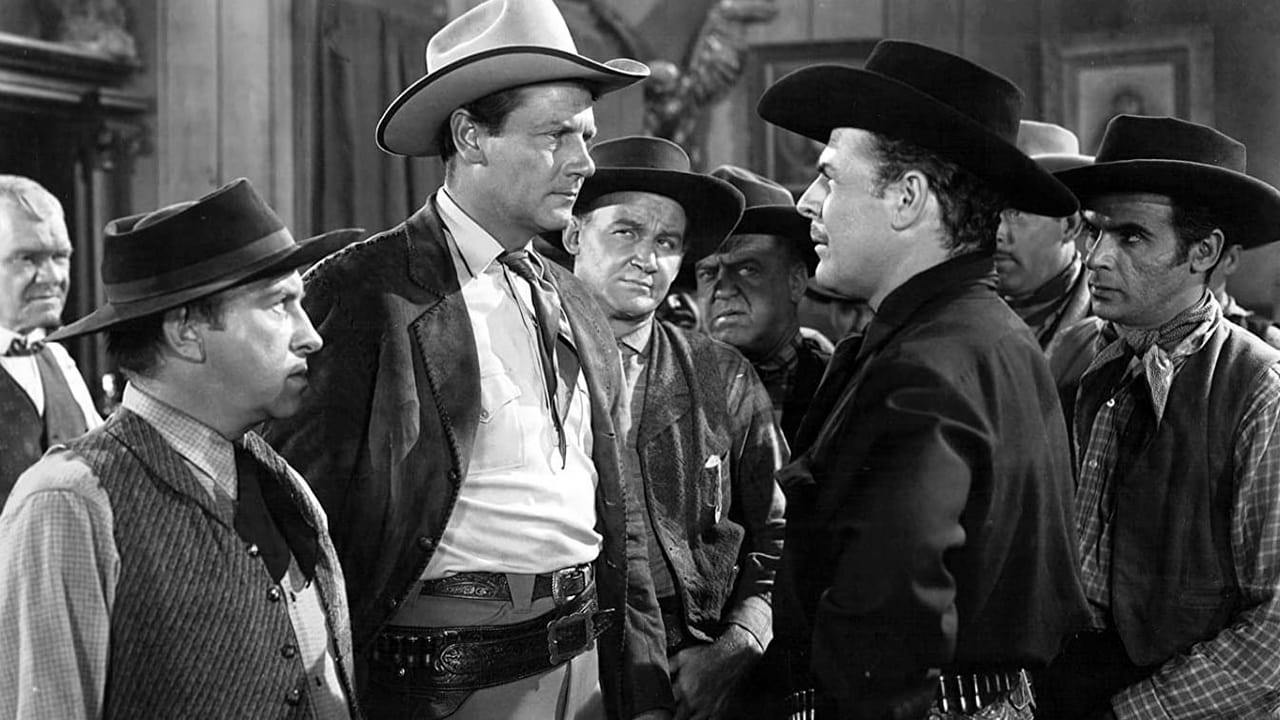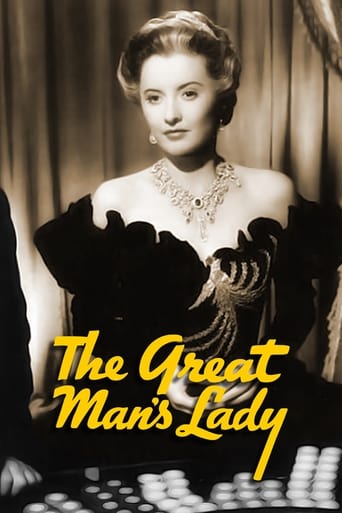

Blistering performances.
... View MoreThere's a more than satisfactory amount of boom-boom in the movie's trim running time.
... View MoreThe best films of this genre always show a path and provide a takeaway for being a better person.
... View MoreThis is one of the best movies I’ve seen in a very long time. You have to go and see this on the big screen.
... View MoreThis is a woman's picture (specifically, Barbara Stanwyck's picture). The narrative skips large portions of time. What a surprise to see in the opening credits that the screenplay is based on a short story by Vina Delmar. Surely, it seems to be based on an epic novel-- and it could easily have been stretched out to 'Gone with the Wind'-style length. The film is compromised by the constraints imposed by the production code (involving the bigamy of Joel McCrea's character and an extra-marital affair between Stanwyck's character and Brian Donlevy). But Miss Stanwyck's hard work helps pull off the story, and the flood scenes are very well photographed, especially a sequence with an overturned stagecoach and infant children. It is easily the most memorable part of the film. There is a lot of rain/water used in this picture. In one scene, the entire studio floor is visibly flooded.Some aspects of the plot are too contrived. It is a little too easy for Stanwyck to turn back instead of going on after the bridge tragedy to find McCrea. Maybe if there had been a quick scene of her attempting to locate him, but the road being washed out where she was forced to turn back, then that would have been more believable. Did anyone else feel as if the biographer was going to turn out to be Stanwyck's stepdaughter, or rather, the daughter of McCrea's character with his second wife? I suppose the filmmakers were prevented from showing McCrea as having committed bigamy, though the marriage certificate at the end proves it.
... View MoreSuch undeserved condescension on the part of most of your reviewers! I thought it was an absorbing romantic drama in which Stanwyck was at her very best. As she turned from youthful sparkly-eyed amused flirt in her first scenes with McCrea into the mature more gray-haired woman seriously urging him to do his political best for those whom he represented, her virtuosity as an actress of transformations came greatly to the fore. It was a pleasure to respond to her in her various moods of youthful love, a stunned mother's loss of her two babies, her vigorous denunciation of her father in his unconscionable request of her, and finally the resignation of old age in which she at last destroys the long-lived marriage certificate she's been carrying around through most of the story.McCrea was also very good, especially in the scene in which he confesses himself guilty of the same kind of corruption so rife in the American West at that railroad-building time.The story seemed to echo the true events of The Ballad of Baby Doe (opera) in its background of silver mining and marital troubles; and it certainly resembled Edna Ferber-Abby Mann's Cimarron in retelling the story of a marriage in which the husband spends years on the road away from his wife.The 19th-century flooding in Sacramento was certainly up to date given the similar events happening in that city in our own times as well.A great movie. Pay no attention to those detractors.
... View MoreThere were two Joel McCreas. One was the fairly noted actor in Western films. But before that, McCrea made many "regular" pics as a leading man, and he was usually very good, if not excellent. I always bypassed this particular film because I was not a fan of McCrea in Westerns.But, although this film takes place in the West, I would not really call it a Western. It's a sort of love story between McCrea and Barbara Stanwyck that happens to take place in the West.The story begins when a statue is being dedicated to the late founder of "Hoyt City", and there's a controversy that he may have been guilty of bigamy. So reporters attempt to interview the 100 year old wife (or is she mistress). A young female writer does get an interview, and Stanwyck (whom you won't even recognize at age 100) explains her story in flashbacks. I'm not a big fan of flashbacks -- I think it's a technique in films that is overdone -- but here it really works.McCrea's character, in my view, does not come off particularly well here, although his acting is perfectly fine. Oddly enough, the man who tries to steal Stanwyck from McCrea comes off as a more likable character, and is well played by Brian Donlevy. There are many trials and tribulations that the main characters have to survive here -- floods, hate, the loss of children, the belief that the wife is dead (which unintentionally does lead to bigamy), and so forth.Stanwyck is excellent here, and apparently this was one of her favorite film roles, and deservedly so.I didn't particularly like the very ending of the film, but aside from that it really held my attention because it is a different kind of film and has uniformly strong acting.I highly recommend it, and savor Joel McCrea before he became a cowboy actor.
... View MoreFake history, played for bathos. On Founders Day in the thriving metropolis of Hoyt City, eager-beaver reporters swarm the home of a 109-year old woman, reputedly once married to founding father Ethan Hoyt; she's surely got a tall tale to tell, beginning when she was just a teenager in 1848 Philadelphia. Barbara Stanwyck begs, borrows, and barters to finance the future of idealistic husband Joel McCrea, who owns a great stretch of land with nothing on it but a shack. The narrative skitters over such crucial story-elements as railroad access, livestock, a water supply, financial aid--all for the sake of marital melodrama. Brian Donlevy, as a shady gambler who has immediate eyes for Stanwyck, does what he can with a character conceived as an afterthought (he plugs up the holes left behind by a screenplay spanning many years' time); Stanwyck and McCrea fare a bit better, though this story is seldom credible, and is often downright loopy. Production is handsome enough, and the intentions behind the film are apparently heartfelt, but there isn't a surprise in its entire 91 minutes. ** from ****
... View More